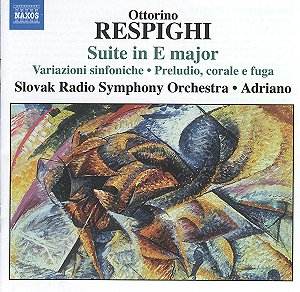This is out of the usual Respighi to
put it mildly.
The Variazioni
Sinfoniche are in a sort of
suavely Brahmsian language linking Brahms
4 and the St Anthony Variations.
There is a real sense of circumstance
about this music: grave, without levity,
tragic at times, yet lean and not in
the least ponderous.
There is a little more
levity in the tripartite Preludio,
corale e fuga which is here
given in a single track. This smacks
somewhat of the balletic Glazunov. but
is also uninhibitedly romantic as at
5:48 as well as touching on the manner
of the Variazioni sinfoniche at
13:10. It ends with a blaze of Brucknerian
majesty.
The Burlesca
marks a break with the suave
quasi-Brahmsian style. The effect is
more impressionistic. This is squarely
the Respighi we know from the Roman
poems.
The Ouverture
carnevalesca is a galloping
romp with a clear Neapolitan sentimentality
and feel-good effect: Dvořák's
Carnival Overture meets
Respighi.
The grey-neutral title
Suite in E major masks a fruity
half hour work in four movements. Again
the influence here is Glazunov in his
best choreographic manner. Some of this
could be lost sections from The Seasons
or
from the more idyllic moments in Dvořák
symphonies 7 and 8. The ardently singing
solo violin might even suggest an Italian
Lark Ascending. The allegretto
vivace reminded me of the Russophile
Bax's ceremonial music. In this work
Respighi is more carefree than in the
Variazioni or the Preludio,
corale e fuga. In the last movement
the work looks forward to the smoothly
Gregorian writing of Respighi's later
years. As for the closing pages they
could not have been written without
the example of Tchaikovsky's Fifth Symphony
and the Capriccio Italien. Fun
though!
There's some quite
attractive writing here but this is
more a stimulating confection for the
Respighian than for the generalist.
Rob Barnett


